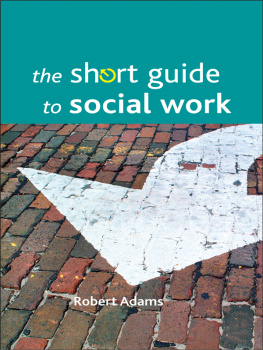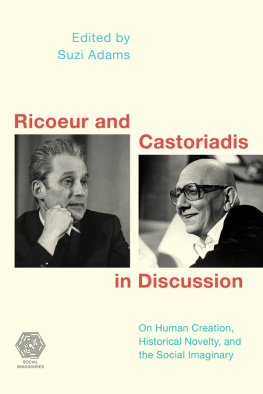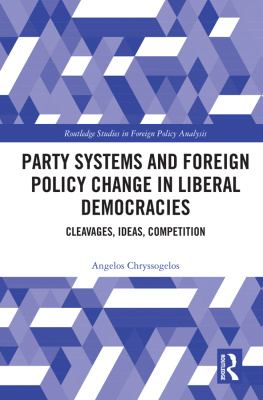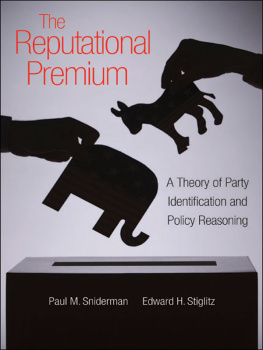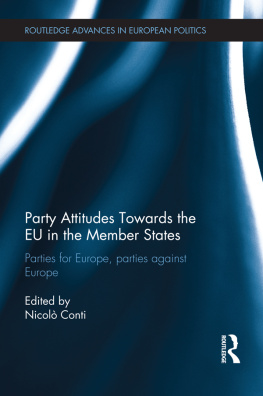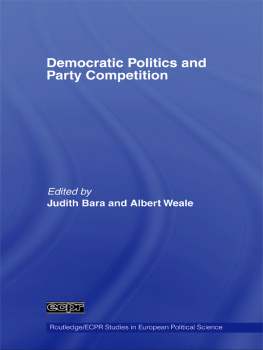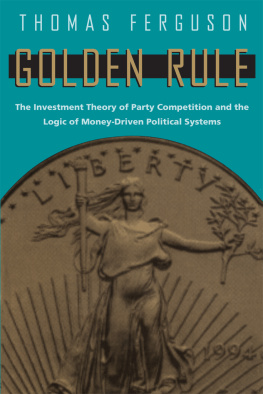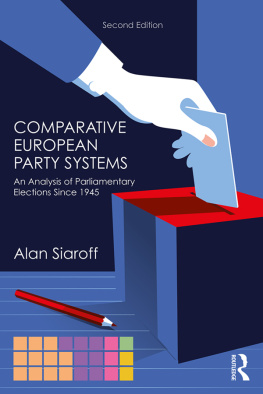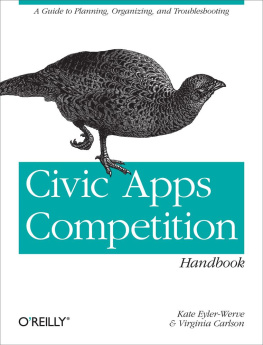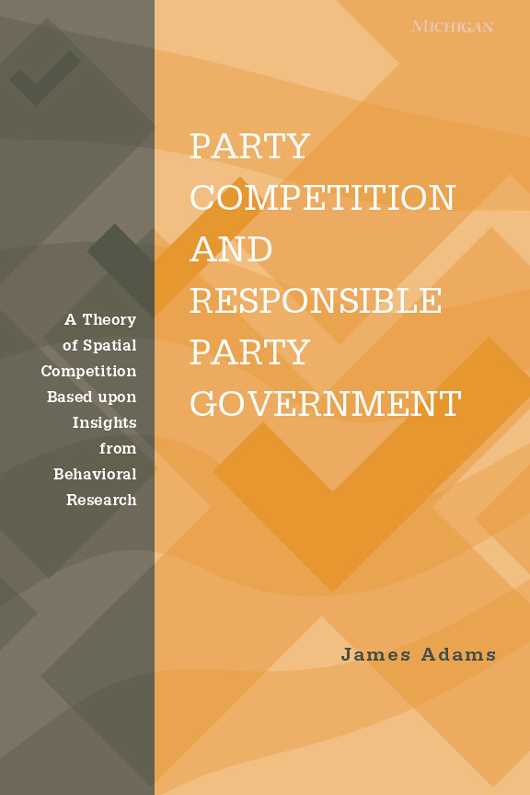Party Competition and Responsible Party Government
A Theory of Spatial Competition
Based upon Insights from
Behavioral Voting Research
James Adams
THE UNIVERSITY OF MICHIGAN PRESS
Ann Arbor
Copyright by the University of Michigan 2001
All rights reserved
Published in the United States of America by
The University of Michigan Press
Manufactured in the United States of
America Printed on acid-free paper
2004 2003 2002 2001 4 3 2 1
No part of this publication may be reproduced, stored in a retrieval system, or transmitted in any form or by any means, electronic, mechanical, or otherwise, without the written permission of the publisher.
A CIP catalog record for this book is available from the British Library.
Library of Congress Cataloging-in-Publication Data
Adams, James, 1962
Party competition and responsible party government : a theory of spatial competition based upon insights from behavioral voting research / James Adams.
p. cm.
Includes bibliographical references and index.
ISBN 0-472-11201-5 (cloth : alk. paper) ISBN 0-472-08767-3 (pbk. : alk. paper)
1. Political parties. 2. Democracy. 3. Voting research. I. Title.
JF2051 .A33 2001
324.201 dc21 2001034778
ISBN13 978-0-472-11201-2 (cloth)
ISBN13 978-0-472-08767-9 (paper)
ISBN13 978-0-472-02718-7 (electronic)
To Dorothy Adams
Figures
Tables
Acknowledgments
The material in this book was developed over the past three years, and has, during that period, been greatly improved by comments and suggestions provided by Ernest Adams, Bill Adams, Ian Budge, Dieter Burrell, Seth DeFilippis, Bernie Grofman, Kent Jennings, David Lazer, David McKay, Nicholas Miller, Gordon Tullock, Eric Smith, and John Woolley. I also note that, in addition to drawing heavily from both the basic Downsian framework and the vast behavioral literature on voting behavior, much of this work was directly inspired by Feld and Grofmans (1991) insight that voter biases arising from non-policy-related considerations have fundamental implications for parties policy strategies. In addition, the sections of this book that consider parties cross-time policy strategies were inspired by Ian Budges (1994) study of this same topic.
I particularly thank Samuel Merrill III and Roy Pierce for their detailed and insightful comments on large portions of the manuscript. Samuel Merrill kindly gave his permission to include a summary of joint work in progress.
The data sets used in this study were made available through the Inter-university Consortium for Political and Social Research (ICPSR), Ann Arbor, and are gratefully acknowledged.
draw from Adams (forthcoming).
I also extend special appreciation to my father Ernest Adams, my mother Anne, and my brother Bill for their support and encouragement during this enterprise.
Finally, I gratefully acknowledge my wife Dorothy Adams, whose love and support made this book possible.
PART I
Party Competition under the Basic Partisan Spatial Model
CHAPTER 1
Political Representation and Responsible Party Government
1.1. Introduction
The linkage between the mass public and political decision makers is one of the central topics in the study of contemporary democracies (Dalton 1996). The study of political representation has stimulated extensive theoretical and empirical work concerning both the process through which citizens can influence the decisions of political elites and the degree to which they exercise such influence.
While research focusing on American politics has frequently conceptualized the representation process as one based upon the connections between the opinions of individual legislators and the policy preferences of the geographically based constituencies they represent (see, e.g., Miller and Stokes 1963; Achen 1975, 1978; and Page et al. 1988), political scientists working in non-American settings have increasingly focused on a theoretical model of representation based upon political parties as collectives. According to this responsible party government model of representation, it is political parties, not individual legislators, that are the primary vehicles that articulate citizens policy beliefs and convert them into public policies. This notion of political representation appears to be appropriate outside of the United States because in non-American settings the members of each partys parliamentary delegation typically act in unison (see, e.g., Harmel and Janda 1982; and Thomassen 1994) so that it makes sense to focus on political parties as collectives, rather than on the behavior of individual parliamentary representatives. Thus, Giovanni Sartori maintains that citizens in Western democracies are represented through and by parties. This is inevitable (1968, 471, italics original; also quoted in Dalton 1996).
Indeed, important elements of the responsible party model of political representation may even apply to the United States. Some scholars argue that the policy link between party elites and their supporters is relevant to policy representation in the United States (see, e.g., Backstrom 1977; Bishop and Frankovic 1981; and Herrera, Herrera, and Smith 1992) or even that in practice policy representation in the United States revolves around parties, not individual legislators (see Ansolabehere, Snyder, and Stewart 1999).
The responsible party government model has inspired extensive theorizing about the necessary conditions that would make it possible for citizens to select parties that represent their policy beliefs and for parties parliamentary delegations in turn to represent their supporters preferences (Dalton 1985; Powell 1982, 1989; Iversen 1994a, 1994b; Ranney 1962). While many such preconditions have been proposed, three requirements relating to the behavior of mass electorates and the behavior of party elites appear especially crucial for responsible party government.
1. Policy divergence among the parties contesting the election. Elections should involve competition between parties that offer divergent policy visions so that voters have meaningful electoral choices (Dalton 1985; Powell 1989). Without such policy divergence, electors have little opportunity to influence government policies through their votes. Furthermore, policy convergence among the competing parties may well leave large portions of the electorate without an attractive party for which to vote, in which case there is little reason to expect agreement between the policies proposed by party elites and the policy preferences of their supporters.
2. Policy stability on the part of the parties contesting the election. Parties should present reasonably stable policies over time, first, because drastic policy shifts may leave voters confused concerning what the party actually stands for (Bartels 1986), which in turn impairs the electorates ability to influence government policy through its votes. Second, even when voters are well informed about the parties current policies, they will have difficulty translating their own preferences into votes if they perceive a high probability that the parties will change their policy positions.
When these requirements on the behavior of party elites are satisfiedand when additionally parties vote as a bloc in parliament, as is typically the case outside the United Statesthen voters choices of parties provide them with a method of exercising control over the actions of individual legislators and through these over the affairs of government (Dalton 1996, chap. 11). However, there is an additional condition the


